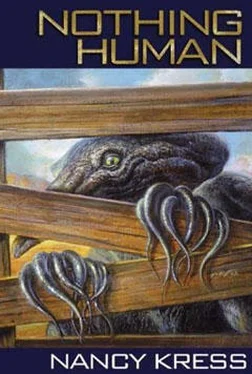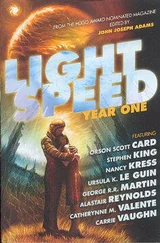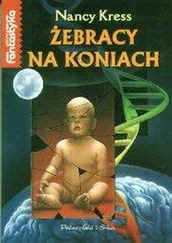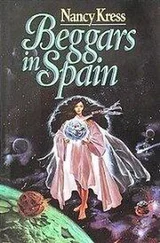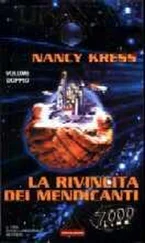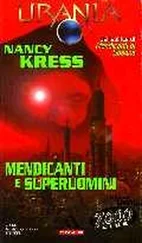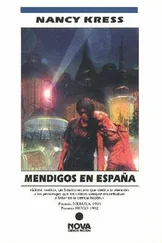Theresa said, “How rich?”
He smiled. “Six billion international credits.”
Theresa sat down on the nearest porch chair, nailed down to keep it from blowing away. Six billion credits. Even with inflation what it had been, that was a fortune. She said bluntly, “Why, DeWayne? With that kind of money, you could buy yourself another wife. Hell, you could buy pretty much anything. Why here?”
“I haven’t ever felt at home anywhere, Theresa. Not since I came out of that trance in a Queens hospital forty-one years ago and learned what I was. And nobody’s been at home with me, either. Andrews was the only time I ever belonged. We’re getting older. I want to settle somewhere.”
Theresa studied him. There were people, she knew, who made their own alienations in life. Maybe DeWayne was one of those. Maybe he’d never belonged because, feeling so different, he never let himself belong. Like, she thought, her throat closing with the old anxiety, like Carlo. DeWayne didn’t look like a man who made emotional revelations easily. Talking to her like this, on her porch long since wind-scoured of any paint, had cost him. Was he telling the truth? Well, Scott and Rafe could check that out on the Net. Could he be trusted? That was a much tougher question.
And then he said, not looking at her, “Rafe said Sajelle is here. And that she isn’t married.”
Oh, God. Damn Rafe! “DeWayne… I have to talk to my sons and daughter about this. Could you come back tomorrow? I’m afraid I can’t let you stay here, but there’s a sort of inn in Wenton… who’s that sitting in your car?”
“Bodyguard. But he won’t be staying. I’ll send him back to the enclave, he—” DeWayne stopped dead.
Sajelle was hurrying up the path from the chicken coop, carrying a basket of fresh eggs clutched against her chest against the wind. Her dreadlocks tossed wildly. Bent over the eggs, she didn’t notice DeWayne until she’d rushed into the comparative shelter of the porch and nearly run into him. Sajelle looked confused to see a stranger, a black man, on the porch. DeWayne hadn’t recognized Theresa right away. Not so now.
He said dazedly, “Sajelle?”
Theresa thought of saying this was Sajelle’s daughter. But Sajelle herself recognized something in his voice or manner. “DeWayne? DeWayne Freeman?”
He seemed unable to speak. Theresa said, “You might as well come in, DeWayne. There are a few little things we’re going to have to explain to you.”
DeWayne stayed, and many things became possible.
In the late spring, Rafe, Emily, and Lillie waylaid Theresa in the barn, pitching hay to the horses. “Tess, we need to talk to you.”
“So talk. But if you’re going to tell me more bad news about the Chinese, forget it. I don’t want to hear it until I have to.”
“It’s not about the Chinese,” Lillie said. “We have a proposition. We want to convince you so you can convince the others.”
Theresa put down her pitchfork and looked at Lillie, who stood a little in front of the others and was clearly their designated spokesman. Lillie had regained her figure after the triplets’ birth more quickly than the other girls. She stood slim and young, direct, her gaze meeting Theresa’s squarely. Lillie’s babies, Theresa knew, were right now being bathed by Carolina and Lupe. Whenever Lillie looked at her children there was a faintly puzzled look in her gray eyes: Mine? Theresa did not understand.
“You know that we learned a lot of genetics aboard the pribir ship,” Lillie said. “We only know how to use pribir equipment, though. But Scott has been teaching Rafe and Emily how to use his Sparks-Markham, plus all the new stuff DeWayne bought, and they’ve been teaching Scott what the pribir taught us. They remember a lot, unlike me and the rest.”
“Yes,” Theresa said neutrally. Why didn’t Lillie feel more involved with her babies? They were adorable, especially little Cord. He had Lillie’s eyes, gray with gold flecks.
“Rafe and Emily put some of the hay genes through the scanner. Also rice from the sacks Carlo bought in Wenton. They experimented with the splicer, and they think they can create hay that will have three times the yield on the same plot of land, and rice that will grow here in the summer rains.”
Three times the yield. They could run more cattle, lots more. The range grew more vegetation than ever, but there was still not enough to sustain her herd year-round without feed. The amount of hay had been the limiting factor on how much cattle she could run. And if rice, which had never in the history of the world grown here, could be raised as a cash crop, the market for it would be large and close. Cheap transportation costs…
Suddenly it hit her. ”’ Create.’ You mean genetically engineered crops.”
“Yes,” Rafe said eagerly over Lillie’s shoulder.
“Anything to do with genetically engineered crops is illegal. You know that. Anything to do with genetically engineered anything — that’s why we’ve been so careful!”
“And we’ll go on being careful,” Lillie said. “No one will know, anymore than they know about us, or about the babies. And anyway you said there’s no law to—”
“There’s vigilantes,” Theresa said harshly. “God, you three don’t remember. You weren’t here during the war.” The labs and corporations that had been the targets of mob rage during and right after the biowar. The CEO of Monsanto had been disemboweled alive. Theresa had seen a Net video.
“That was eleven years ago,” Lillie said logically. “And anyway, no one will know. Wenton doesn’t have any gene-analyzing equipment. We’ll just say DeWayne bought a different kind of seed from back East, and we’ll offer to share planting seeds for the hay with anyone who wants them. Look, Tess, I’ve done some figures.”
Lillie held out a piece of DeWayne’s grayish paper, another new luxury, and began to go over the numbers for Tess. Costs, needed labor, projected market price, possible profit range. The handwriting was the round unformed hand of a schoolgirl.
“Lillie, who taught you to do this?”
Lillie looked surprised. “Nobody taught me. It’s just common sense.”
And Lillie had always had a lot of that. No maternal feelings, but a direct pragmatism even greater than Theresa’s own. She said, “Does Scott know all this?”
“No,” Lillie said.
Rafe said transparently, “We thought you, as boss, were entitled to see it first.”
“No, it wasn’t that,” Lillie said. “Scott isn’t going to like it. He wants us to keep as much out of public notice as possible. We’re showing it to you first so you can change his mind.”
Emily said eagerly, “We know it will work!” Unlike Lillie, she had baby-food stains all down the front of her maternity smock, which she was still wearing because she hadn’t lost all her pregnancy weight.
Theresa looked at the three young faces: Rafe excited, Emily hopeful, Lillie coolly considering. It was an interesting idea. Rice… Theresa could almost see the low green plants growing in the flat land below the cottongrove, where the creek flooded regularly. Regularly enough? Maybe they could build a little dam…
“I’ll talk to Scott,” she said, “and Jody, Senni, Carlo, and Spring. We’ll see.”
“We can increase farm income by about twenty percent, not counting DeWayne’s contribution,” Lillie said. “That’s a lot of flour and cloth and ammunition.”
“Not,” Theresa noticed, “a lot of diapers.” Oh, Lillie.
After much argument, they planted a test crop of the genetically engineered crops. Both hay and rice flourished. It was only a few inconspicuous square yards of land under cultivation this year, but next year…
Читать дальше
